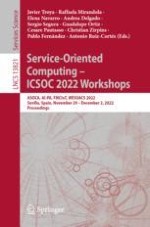2023 | OriginalPaper | Chapter
Comparing Ordering Strategies for Process Discovery Using Synthesis Rules
Authors : Tsung-Hao Huang, Wil M. P. van der Aalst
Published in: Service-Oriented Computing – ICSOC 2022 Workshops
Publisher: Springer Nature Switzerland
Activate our intelligent search to find suitable subject content or patents.
Select sections of text to find matching patents with Artificial Intelligence. powered by
Select sections of text to find additional relevant content using AI-assisted search. powered by
